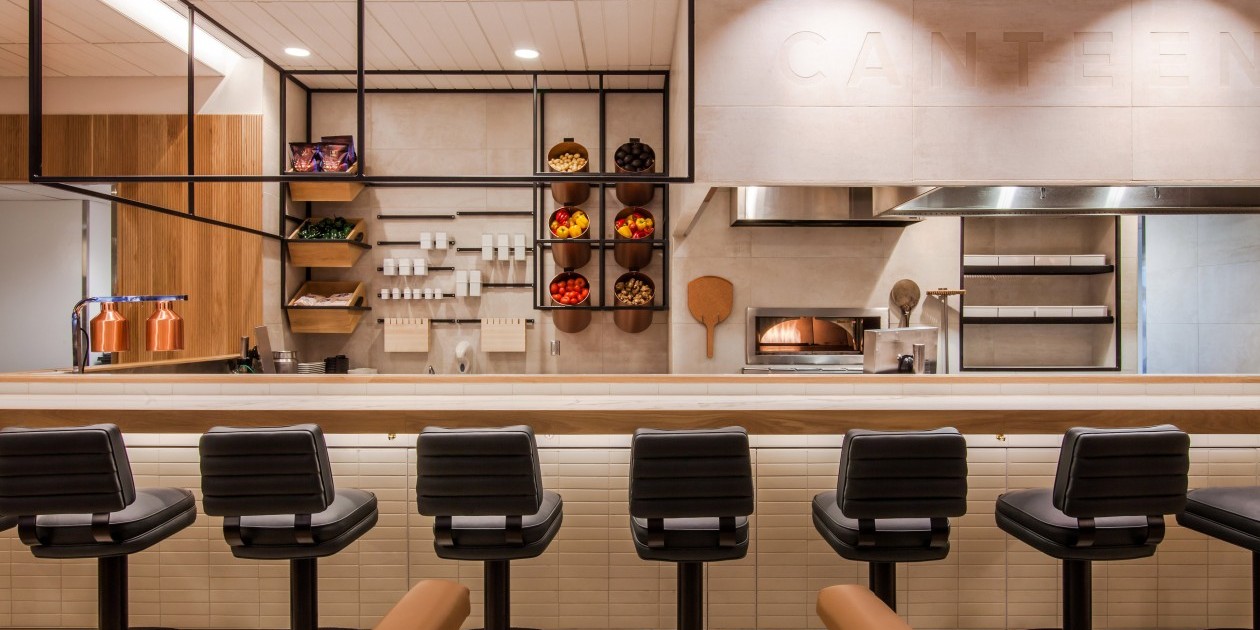This story was updated July 14 @ 3:20PM
Earls has opened Earls.67, a new prototype restaurant in Calgary that could shake up the way the restaurant chain operates.
Ironically, the opening of Earls.67 comes only weeks after Earls itself was shaken by a controversy over the sourcing of its beef.
The restaurant, which opened last week on the Stephen Avenue Mall in downtown Calgary and is Earls’ 67th outlet, features everything from “conscious sourcing” to a minimum 16% hospitality charge in lieu of tipping.
Earls president Mo Jessa notes the chain, owned by the Fuller family, has been around for more than 30 years. “67 is a direction from the family to say ‘Let’s try to make a restaurant that we think deserves to be around another 30 years.’”
The $7 million restaurant, housed in a former 10,000 sq. ft. Earls that closed for six months for renovations, allows the company to test ideas it couldn’t in the past, Jessa says.
The size of the Vancouver-based chain “was always one of the main constraints that was proposed to me of why we couldn’t change things more radically.”
But, the creation of Earls.67 has resulted in a new discipline within the company “that’s going to allow us to keep innovating in the future. I don’t think innovation is a one-off thing.”
Earls.67 “is going to be how you and I live,” Jessa says. “We abstain, but at the same time we indulge. We don’t just live with moderation every day.”
People are increasingly interested in healthy eating, but also want to indulge, he says. Casual dining restaurants have responded with healthy menus. However, Earls.67 is taking a different approach, offering both “cheat days and healthy days” with smaller portions and “the most creative, worldly cuisine you can imagine.”
The menu allows customers to build up or build down their orders. “You can come in and get a sushi for $10, a salad for $8, add a protein for $4 – combining different items to decide whether you want to eat a lot or a little.”
On the design front, Earls.67 has several different zones with multi-use space that can transform throughout the day. “People are living in smaller spaces [so] the way people entertain is going to change and restaurants will fill the gap on how people socialize.”
As for the 16% hospitality charge, Earls is testing customers’ reactions and is giving itself a six-month hard deadline “to decide whether this is something for casual dining or not,” says Jessa: “I would say there’s nothing certain about this experiment other than a lot of learning.”
Mandatory tipping has become a trend in the U.S, and is growing in Canada, he says. “We thought ‘hey if we’re going to do a prototype, why not actually test something as part of the prototype’ – what the customers’ reactions are, how they feel about it, and give ourselves a hard deadline of six months and research constantly with our people and our guests and at the end decide whether this is something for casual dining or not.”
Asked whether it could go chain-wide: “I don’t have any plans for it right now. Whether it’s needed or not I’m not sure, it would depend on the market.”
He notes employees at Earls.67 are paid higher than minimum wage and the “hospitality pay” is divided among all staffers.
Though Earls.67 had some social and local media coverage “the restaurant has to speak for itself. If it’s a good idea, it’ll be busy. What we’re spending time on is a focus on the operations and making sure we get it right.”
The restaurant is committed to conscious sourcing, Jessa says, which is “important to the next generation of consumers.” Menu items have designations such as Gluten Aware, Vegetarian and Ocean Friend (recommended by the Vancouver Aquarium), and there are free-run, antibiotic free chicken and cage-free eggs. Beef is Canadian-sourced and raised without antibiotics, steroids or added hormones, consistently audited by a third party for animal welfare.
In April, Earls came under fire when it announced it would start sourcing antibiotics- and hormone-free beef from a Kansas ranch accredited by the non-profit group Humane Farm Animal Care as no single Canadian supplier was big enough to supply the entire chain.
The backlash was immediate and “had a massive impact in the sense that people would be talking about boycotting Earls,” Jessa says. “For a restaurant that really believes in being loved by its customers, it was really a traumatic experience to be actually called out on not being aligned with Canadians and not being aligned with the beef industry.”
Weeks later, Earls changed course and announced that Canadian beef was back on its menus in Alberta and Saskatchewan and that all restaurants would serve Canadian-raised, ethically treated beef free of antibiotics and hormones within two years.
“We’ve learned a lot from that experience, changing things to make sure it never happens again and to make up for what we’ve done,” says Jessa. “I couldn’t be more apologetic. I’m letting (ranchers) know how terrible I feel.”
Consumers in general support the policy and “are giving us little pats on the back –‘good for you guys for trying.’ It’s just the way we did it that they’re really upset about.”
Jessa notes he is still meeting with ranchers regularly to discuss what went wrong with the restaurant’s approach, including an Angus Association meeting next week. “I have to go back and restore relationships – eventually people will realize that there was no intent to hurt Alberta beef producers.”
Earls has restaurants from the Yukon to Ontario and is now looking at the Quebec market for Canadian expansion, Jessa says. An Orlando restaurant scheduled to open in September will be the chain’s eighth in the U.S.
Faulhaber Communications is handling PR for the Earls.67 launch.











